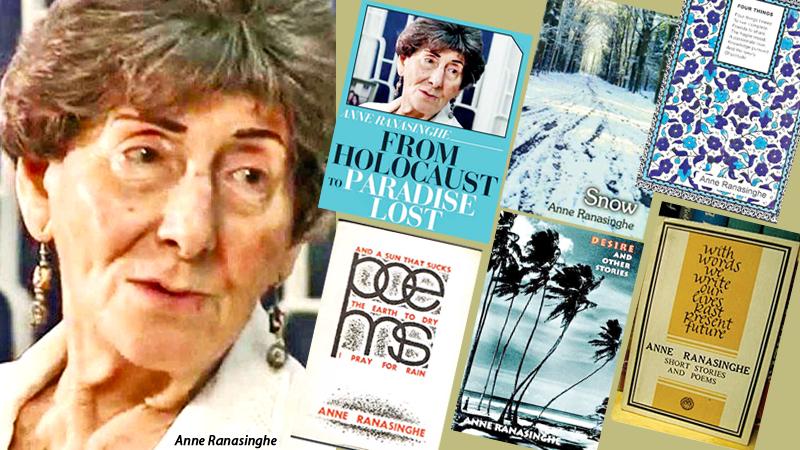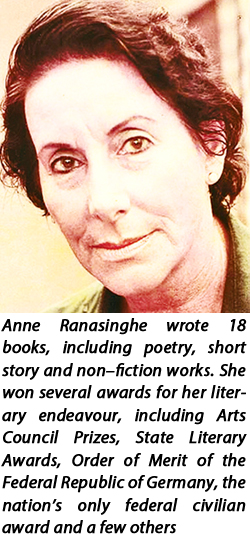
When Anne Ranasinghe, a Sri Lankan English language poet died four years ago on December, 17, 2016 at 91, most people didn’t know that she was a Jewish – German born writer and that her real name was Anneliese Katz. She lived in Sri Lanka for 64 years.
Ranasinghe was born in October 2, 1925 in Essen, Germany to a Jewish family. Her father was Über Emil Kartz who came from Züschen, Waldeck to Essen. Anne’s mother was Aenne Kartz from Cologne. His father’s family lived in Züschen for over 100 years while her mother’s family was also not new to Cologne. Her father Über Emil Kartz joined the German army in World War l. After he returned from the War, he made his home in Essen.
German experience
 When Adolf Hitler became the Head of the State in Germany in August 1934, anti-Semitic policies intensified. It reached a peak with the state-pogrom of November in 1938. On November 10, her father was arrested and taken to an unknown place. That night a gang of Nazis broke into their house and ransacked it, smashing all the glasses.
When Adolf Hitler became the Head of the State in Germany in August 1934, anti-Semitic policies intensified. It reached a peak with the state-pogrom of November in 1938. On November 10, her father was arrested and taken to an unknown place. That night a gang of Nazis broke into their house and ransacked it, smashing all the glasses.
The previous night, the synagogue in Essen, Germany’s most magnificent and largest synagogue had been set fire and it was still burning. However, she and her mother could save their lives from the Nazi gang as they hid in the store room. Her father returned home, but he was physically and mentally wrecked.
When the situation turned too dangerous, her parents decided to send their daughter to England as they had a relative – an aunt of Anne – in London. She left Germany in January 1939 at 14. She left by train via Venlo and Flushing, and crossed a stormy winter channel by boat to the British port of Harwich.
When she arrived at Liverpool Station in London, she was received by her aunt whom she never met earlier.
Within a week, she was dispatched to a school 140 miles away from London, Parkstone Girls’ Grammar School in Dorset. Before she came to England, she attended a Jewish high school, Jawne Gymnasium in Cologne which was the only Jewish school there. Within six months, the Second World War broke out.
She was metamorphosed from a refugee to an enemy for her fellow people in England as she came from Germany and that her mother tongue was the German language. Meanwhile, her parents were deported to the ghetto in Lodz, Poland in 1941, and were murdered in Auschwitz in 1944 – she got to know about this later. She changed her language from German to English.
Arrival in Sri Lanka

When she graduated, the war was at its peak. She started nursing. She trained as a nursing sister at Charing Cross Hospital and King’s College, Moorfields Eye Hospital, the Chelsea Hospital for Women and the Burden Neurological Research Institute in Bristol. Meanwhile, she met a a doctor who was pursuing post – graduate studies in England. He was Don Abraham Ranasinghe from Sri Lanka.
They got married in 1949, and Anneliese Katz became Anne Ranasinghe. When Dr. Abraham Ranasinghe had to go back to Sri Lanka (then Ceylon) after his post graduate degree, she also decided to join him. But it was in 1952, two years later. She started her new life in Sri Lanka and received the citizenship in 1956.
Sri Lanka was strange to Anne. She hadn’t any relationship with it except for her husband’s home country. She was a Jewish. There was no synagogue too in Sri Lanka where she could go and practise the religion. She was accustomed to the seasonal, cool European climate whereas she had to conform to the tropical climate in Sri Lanka.
Although she felt a cultural gap too, she never left the country. She even didn’t move to England or Israel where she would have been at ease as a Jew, at least after her husband’s death in 1981. When Anne married Dr Ranasinghe in 1949, he was a widower and had three children from his previous marriage.
She never bothered about that. She had four children from him too: two sons and two daughters. However, one major reason for her to stay in Sri Lanka was her husband’s religious affiliation.
He was a committed Buddhist and closely associated with bhikkhus and the temple. Because of this Sinhala Buddhist background, he gave Sinhala names to his children –Ananda, Nihal, Shanthi and Renuka. The children practised Buddhism too.
Another reason for her stay was her husband’s profession. He became a lecturer at Colombo Medical Faculty in 1951.
He was subsequently appointed Professor of Obstetrics and Gynaecology at the University of Colombo, and then promoted to the Head of the Department of Obstetrics and Gynaecology of the Medical Faculty.
On retirement, he was honoured as Professor Emeritus, and in 1979, he was appointed Chancellor of the University of Colombo.
In 1980, he was awarded the degree of Doctor of Science Honoris Causa. With such high prestige, she had to support her husband.
Literature
Anne Ranasinghe’s first book was And the Sun that Sucks the Earth to Dry, a collection of poetry published in 1971. She wrote 18 books, including poetry, short story and non–fiction works.

She won several awards for her literary endeavour, including Arts Council Prizes, State Literary Awards, Order of Merit of the Federal Republic of Germany, the nation’s only federal civilian award and a few others.
There are thousands of books in Holocaust literature. Yet they were not exclusively produced by survivors, they were written by non–survivors too. Anne Ranasinghe’s works belong to the non–survivors’ literature though she considers herself as a Holocaust survivor.
She was a survivour because she saved her life by luck. If the Nazis hadn’t allowed her to leave Germany, she might have become a victim of the Holocaust. However, she wrote her Holocaust related poems and short stories from what she heard and read.
Anne, through her literature, questions God or nature as to why such catastrophe occurred confirming the uncertainty of life.
However, she offers new insights into the existence too. At What Dark Point, a Holocaust poem by Anne is an example. Don’t Cry is another Holocaust poem by Anne:
Don’t cry Because the
pot is broken:
It had long been cracked.
But gather the shards
Dig a deep hole
And bury them.
And the rain will smoothen
The disturbed earth
The sun will bake, and wind trace
New landmarks
Till finally you won’t remember
Even the place……
Emphasis on memory
Anne always reiterated the importance of memory. Her literature was based on memory. In her keynote speech on November 5, 1988 at the reopening of the restored ‘Alte Synagoge’ (Old Synagogue) in Essen, Germany, which was burnt by the Nazis on November 9, 1938 in a pogrom, the so-called ‘Night of the Broken Glass’, she valued the significance of the memory:
“…. there is also the Jewish tradition which believes in Takum ha Olam, the ‘repairing’ of the world.
The town of Essen has taken this important step of restructuring the Alte Synagoge (Old Synagogue). I share with Professor Elie Wiesel’s deep conviction that memory is our shield, our only shield; and the work that has been done here fosters this deep truth.
The Alte Synagoge has become a memorial where one does not gloss over the crimes of the past, where, on the contrary, they are listed and recorded, and where young people are instructed in what precisely happened during those evil days. They are encouraged to research the period themselves and to participate in activities initiated by the Synagogue.”
Anne needed to fulfill her responsibilities on behalf of the dead. She thought remembering them was her moral duty.
